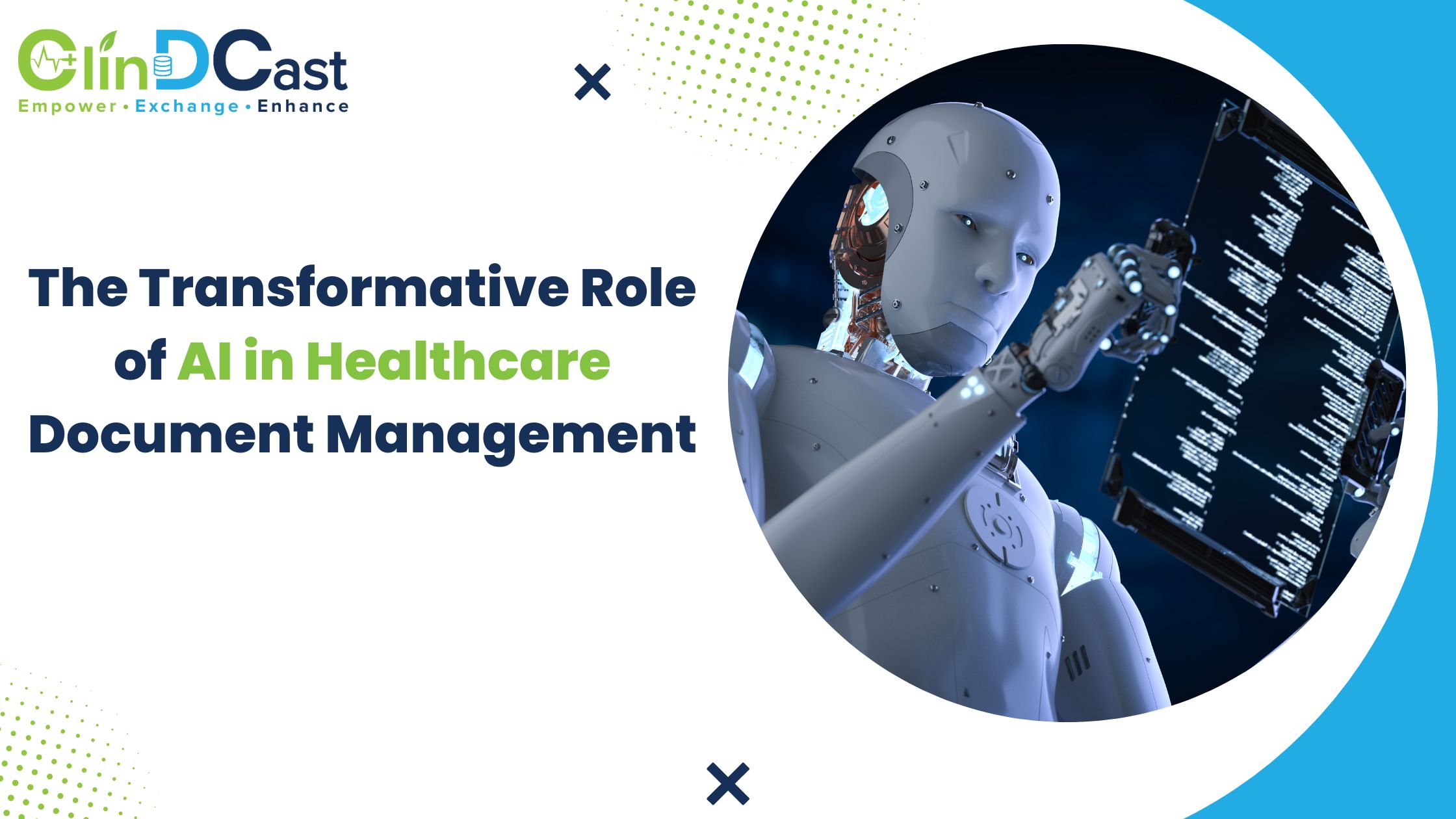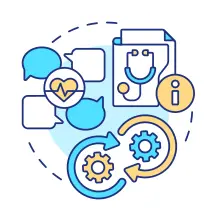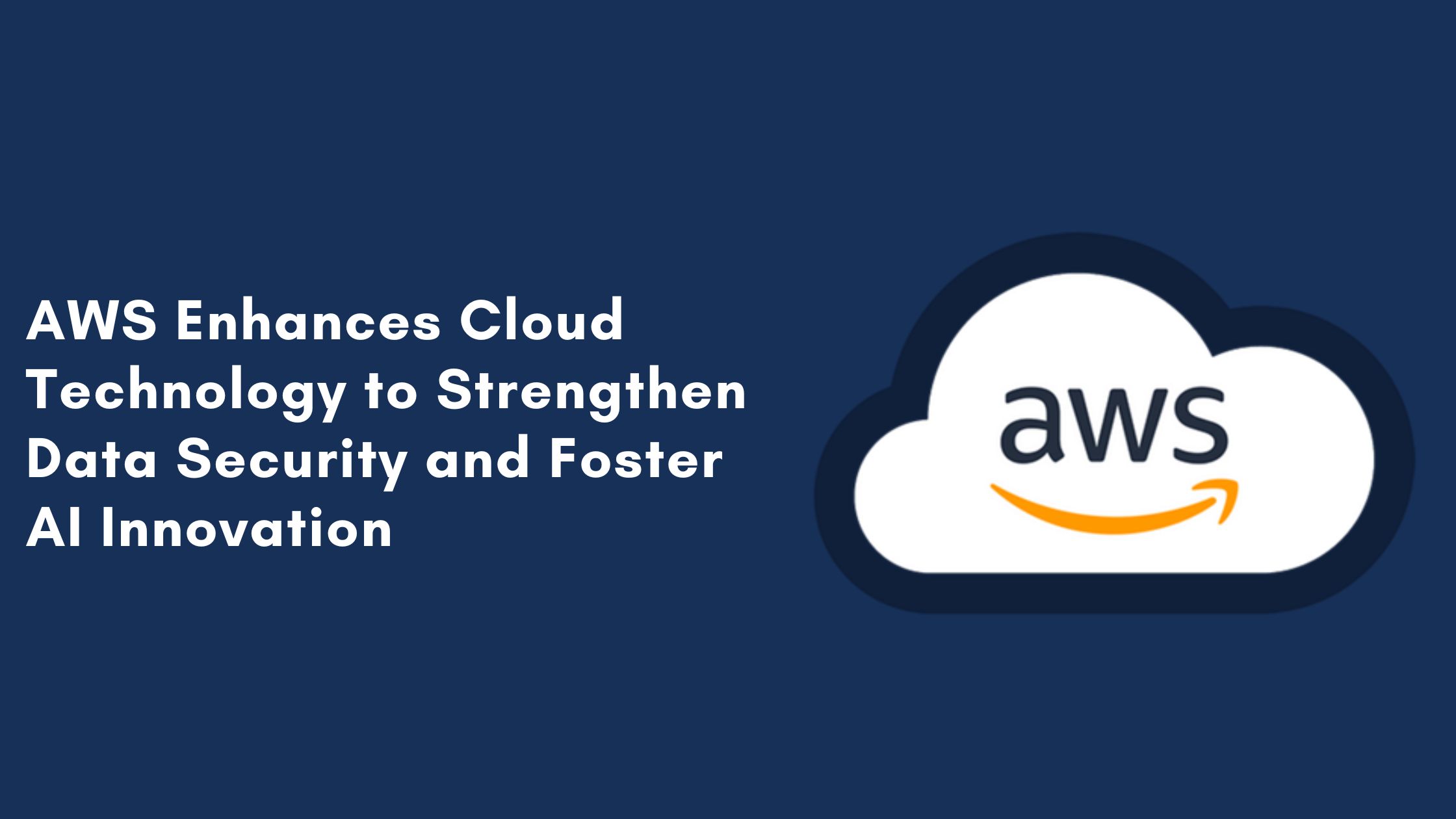
Artificial Intelligence (AI) has brought about a dramatic shift in many different industries, and the healthcare sector is leading this transformation. AI has a particularly significant influence on healthcare document management, simplifying processes and enhancing the capacity to collect, retrieve, and use patient data with never-before-seen efficiency.
Through the use of Natural Language Processing (NLP) and machine learning, AI systems convert cumbersome paper trails into intelligent, easily navigable digital archives. By enabling prompt access to health information, this advancement not only improves patient care but also opens the door to tailored treatment, enhanced analytics, and better healthcare outcomes.
The use of AI in healthcare document management is not a passing fad; rather, it is a necessary development that will influence how healthcare practitioners handle information going forward. We’ll discuss the different issues facing healthcare document management today and The Transformative Role of AI in Healthcare Document Management in today’s blog.
What is AI’s role in healthcare document management?
By automating processes like data extraction, classification, and analysis, artificial intelligence (AI) plays a critical role in healthcare document management. It improves the effectiveness, precision, and accessibility of medical records, which eventually leads to better patient outcomes. I you want to know more about the The Transformative Role of AI in Healthcare Document Management so without any delay read the complete blog.
Ongoing Challenges within Healthcare Document Management
The management of medical records in the healthcare industry is beset by serious problems that impair productivity and care quality. The sheer amount of paperwork produced in healthcare settings—from administrative to patient records—is a major problem that can overwhelm manual filing systems and cause mistakes or delays in getting access to vital data.
Complexity is further increased by the need for healthcare professionals to negotiate a maze of legal requirements while upholding security and confidentiality standards in order to ensure compliance with ever changing healthcare legislation. The following are a few of the current issues facing the healthcare document management sector:
- Data security : Sensitive patient data found in healthcare documents makes them easy targets for attackers. Encryption, access limits, and frequent audits are examples of strong security measures that are essential for protecting patient data. Artificial intelligence (AI)-powered security systems quickly identify possible threats, identify anomalies, and continually monitor system behavior. Data security is strengthened by machine learning algorithms that examine behavioral patterns to identify suspicious activity or unauthorized access.
- Interoperability: The multiplicity of systems and formats used to store and share patient data across various healthcare providers and institutions is a problem for interoperability in healthcare document management. It is typically challenging to standardize protocols and formats in order to facilitate smooth information flow and communication between these heterogeneous systems. Artificial intelligence (AI)-driven solutions can translate between systems, standardize data formats, and enable easy data interchange. For integration into EHR systems, NLP algorithms gather pertinent data from unstructured documents.
- Document Accessibility and Retrieval: For physicians to deliver treatment on time, it is essential to have rapid and simple access to patient records. Healthcare document management solutions need to make it easy to retrieve documents quickly while maintaining appropriate access controls to safeguard patient confidentiality. Search engines powered by AI enhance document retrieval using intelligent features. Semantic search is made possible by natural language processing, which by comprehending context, improves efficiency and accuracy. This improves healthcare professionals’ accessibility.
- Digitization and Capture of Documents: Transforming paper-based documents into digital formats can be laborious and prone to mistakes. To reduce manual labor and guarantee data accuracy, Document Management Systems (DMS) should provide effective document capture and digitization procedures. AI automates the conversion of paper documents to digital representations, just way OCR and IDR do. They reduce the time and effort required for human entry by accurately extracting text, images, and data from scans.
- Document Version Control: There are frequent updates and revisions made to healthcare papers, resulting in several versions of the same document. To guarantee that healthcare practitioners have access to the most up-to-date and accurate information, version control must be maintained. AI version control systems automatically identify the most recent version, manage revisions, and track changes. To guarantee that healthcare providers have access to the most pertinent data, machine learning algorithms examine document histories.
- Mobile Access: For the purpose to access and share patient information, healthcare providers are increasingly using mobile devices. Mobile-friendly interfaces and safe access are essential for document systems. Mobile apps with AI capabilities provide secure access to patient records and healthcare documents. Professionals can access vital information from any location thanks to their usage of AI for data security, which also includes encryption and biometric authentication.
Future of AI in the Healthcare Document Management Space
Automation with NLP and Machine Learning:
- Healthcare document management systems will soon be able to automate processes like data extraction, classification, and indexing thanks to AI technologies like Natural Language Processing (NLP) and machine learning algorithms.
- This automation improves accuracy and efficiency while drastically lowering the time and resources needed to manage enormous volumes of medical records.
Improved Accessibility and Decision-making:
- Healthcare practitioners can make better decisions by having fast access to pertinent patient information thanks to AI-powered document management solutions.
- AI makes educated decisions easier by increasing accessibility, which improves patient outcomes and streamlines the delivery of healthcare.
Enhanced Analytics for Insights:
- AI-driven analytics provide insightful information about patient outcomes, healthcare trends, and the effectiveness of treatments.
- These discoveries support more individualized patient treatment and spur advances in medical research, which eventually lead to better healthcare outcomes and delivery.
Catalyst for Innovation:
- An important turning point in the development of the healthcare sector has been reached with the incorporation of AI into document management systems.
- AI helps us move toward a future where healthcare delivery is more individualized, effective, and accessible by acting as a catalyst for innovation as well as a solution to current problems.
Future Strides in Document Management:
- Document management will advance even further as long as AI is developed further and integrated into healthcare systems.
- This development is expected to transform the management of medical records and usher in a time of seamless, secure, and patient-centered healthcare services.
How does AI improve the efficiency of document management in healthcare?
AI reduces the time and resources needed by automating manual document management operations like data entry and indexing. By streamlining processes, this automation frees up healthcare personnel to concentrate on patient care.
How does AI ensure the security and privacy of patient data in healthcare document management?
Robust encryption, access controls, and anonymization techniques are utilized by AI-powered systems to safeguard patient data against cyber threats and unauthorized access. Patient confidentiality is ensured by adhering to regulations like HIPAA.
Conclusion:
We hope now you have complete information about The Transformative Role of AI in Healthcare Document Management after reading our blog. In brief we just want to say that, AI is automating data extraction, delivering clinical decision support, and improving image analysis capabilities, all of which are revolutionizing healthcare document management. Healthcare companies may expedite medical research, boost patient care, and increase operational efficiency by utilizing AI technologies.
Nevertheless, to fully utilize AI in healthcare, privacy, security, and ethical issues must be addressed, and politicians, data scientists, and physicians must work together to promote collaboration. AI has the potential to completely transform healthcare document management and open the door to a more effective, fair, and patient-centered healthcare system with the correct policies and protections in place.






















